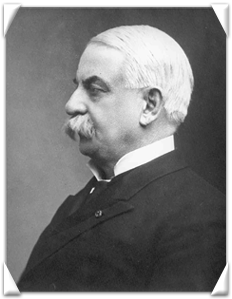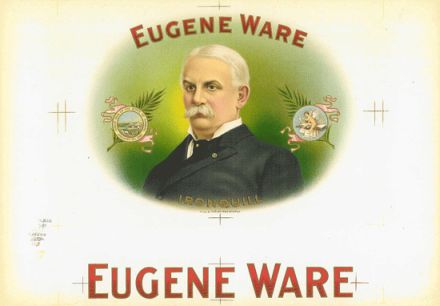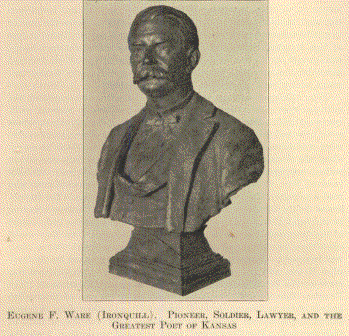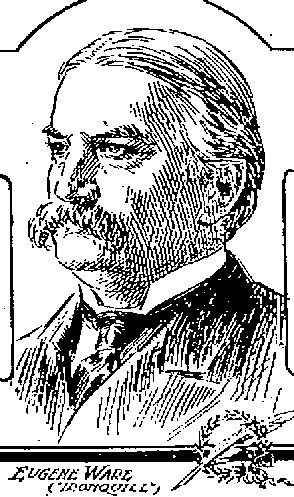|
Eugene Fitch Ware
[The photograph from which the digital image was created hangs at Eugene Ware Elementary School. Information on the back of the photograph reads: "Presented to Eugene Ware School , April, 1949, by his three daughters: Abby Ware Nies, Jeannette Ware Nelson, and Amelia Ware Baird."] [My thanks to Eugene Ware Elementary School, its principal, Billie Jo Drake, and to Linda Hessong, for the photograph and the information about it.]
Eugene F. Ware was born in Hartford, Connecticut on May 29, 1841. His family moved to Burlington, Iowa when he was a young boy. He learned harness-making and did harness work until he enlisted in an Iowa regiment at the beginning of the Civil War. He entered the regiment a private and at the end of his service in 1867 was a captain. Ware moved to Kansas and homesteaded a farm. Nathaniel Thompson Allison in the History of Cherokee County Kansas and Its Representative Citizens (1904) describes Ware's settlement in Cherokee County, Kansas:
[*The version of the poem found in the History of Cherokee County Kansas has been corrected to conform to "The Washerwoman's Song," in Eugene Fitch Ware, Rhymes of Ironquill (Topeka, Kansas: T.J. Kellam, 1885)] Ware later took up residence at Fort Scott, Kansas where he studied law. He was admitted to the bar in 1871 and in 1872 became editor of the Fort Scott Monitor. The next year he opened a law office in Fort Scott. It was during this period that Ware began writing poetry under the name "Ironquill." Ware, in addition to his work as a lawyer, businessman, and his writing (poetry and historical works) served in various public offices. He was twice elected to the state senate, and in 1888 was a presidential elector-at-large for Kansas. In 1893 Ware moved to Topeka and joined the law firm of Gleed & Gleed. In 1907 he was appointed Commissioner of Pensions by President Theodore Roosevelt. In 1911, Ware would move again, this time to Kansas City where he take up the practice of law with his son. In 1911, in the spring, he retired from the practice of law and returned to his farm. On July 1 of that same year he died at Cascade, Colorado. Ware is buried in the National Cemetery at Fort Scott. [Source: Biographical sketch accompanying the publication by Ware's children of one his his unpublished papers. See Eugene F. Ware, History of Sun-God Section, at note 1, 6 (3) Kansas Historical Society Quarterly 295 (1937)] Eugene Fitch Ware Eugene Fitch Ware Letter to President Roosevelt Presenting Ware's Poetry
Collection of James R. Elkins || label acquired from Cerebro Poems [To-day] [Childhood] [John Brown] [Dewey] [Sampson
] [The
Kansas October] Poetry Eugene Fitch Ware, Rhymes of Ironquill (Topeka, Kansas: Kellam, 1885)(Kellam, 1889)
______________, After Me the Deluge: An Historic Tale (Denver: Smith-Brooks Printing Co., 1894) [pseud. Oliver Ironquill] Legal Verse Anthologies Eugene Ware, "Lewis v. State," in Ina Russelle Warren (ed.), The Lawyer's Alcove: Poems by the Lawyer, for the Lawyer and about the Lawyer 235-237 (New York: Doubleday, Page & Company, 1900)(Buffalo, New York: William S. Hein & Co., 1990) Writings Eugene Fitch Ware, The Irrigation Laws of Kansas: With Extracts from the Laws of the United States on the Subject of Irrigation (Topeka, Kansas: Crane & Company, 1896) _______________ (trans.), Roman Water Law: Translated from the Pandects of Justinian (St. Paul, Minnesota: West Publishing Co., 1905)(Littleton, Colorado: F.B. Rothman, 1985) _______________, From Court to Court: Setting Forth the Method of Taking a Case from a State Court to the United States Supreme Court (Topeka: Printed by the Hall Lithographing Co., 1906)(pamphlet)(St. Paul, Minnesota: West, 1930) _______________, The Glan-ik; a Trade Language Based upon the English, and Upon Modern Improvements in Shorthand, Typewriting and Printing (New York, 1906) [online text] _______________, The Lyon Campaign in Missouri: Being a History of the First Iowa Infantry and of the Causes Which Led up to its Organization, and how it earned the thanks of Congress, which it got: together with a birdseye view of the conditions in Iowa preceding the great Civil War of 1861 (Topeka, Kansas: Printed by Crane, 1907) [online text] _______________, The Autobiography of Ithuriel: A Chapter in Psychology (Topeka, Kansas: Printed by Crane & Company, 2nd ed., 1909)(under the pseudonym Ironquill) [online text] ______________, The Indian War of 1864 (Topeka, Kansas: Crane & Company, 1911)(New York: St. Martin's Press, 1960)(Lincoln: University of Nebraska Press, 1994) Writings: Articles Eugene F. Ware, History of Sun-God Section, 6 (3) Kansas Historical Society Quarterly 295 (1937) Bibliography: Articles James C. Malin, Ironquill's "The Washerwoman's Song," 25 (3) Kansas Historical Society Quarterly 257 (1959) ____________, Eugene Ware's Concern About a Woman, a Child, and God, 25 (4) Kansas Historical Society Quarterly 402 (1959) ____________, Eugene Ware and Dr. Sanger: The Code of Political Ethics, 26 (3) Kansas Historical Society Quarterly 255 (1960) _____________, Eugene F. Ware, Journeyman Poet—Acceptance by Fort Scott, 31 (4) Kansas Historical Society Quarterly 396 (1965) ____________, Eugene Ware, Master Poet—Acceptance by Fort Scott and the State of Kansas—History as Business (Commerce), and as War, 32 (4) Kansas Historical Society Quarterly 401 (1966) _____________, Notes on the Several Editions of Eugene F. Ware's Rhymes of Ironquill, 33 (4) Kansas Historical Society Quarterly 481 (1967) ____________, Notes on the Poetic Debts of Eugene F. Ware—Ironquill, 35 (2) Kansas Historical Society Quarterly 165 (1969) ____________, Eugene F. Ware's Literary Chronology, 37 (3) Kansas Historical Quarterly 314-332 (1971) C.S. Gleed, "Eugene Fitch Ware"; William E. Connelley, "Acceptance [of Bronze Bust of Mr. Ware] on Behalf of the Historical Society"; C.E. Cory, "Eugene Fitch Ware as a Literary Man"; J.S. West, "Eugene Ware," in 13 Kansas Historical Collections 19-71 (1913-1914) Eugene. F. Ware. Kansas Lawyer and Poet. Obituary, 18 Case & Comment 283 (1911) Brian Moline & M.H. Hoeflich, Some Kansas Lawyer-Poets, 55 U. Kan. L. Rev. 971, at 971-978 (2007)
Research Resources |



 \
\